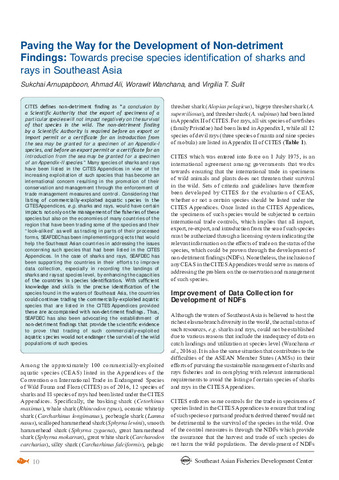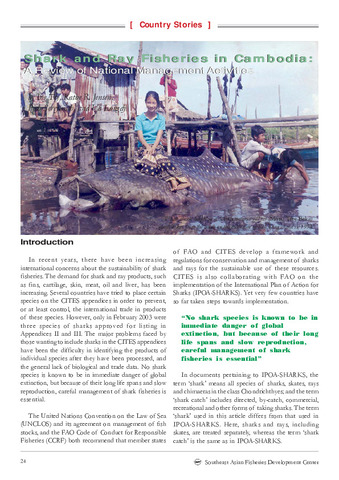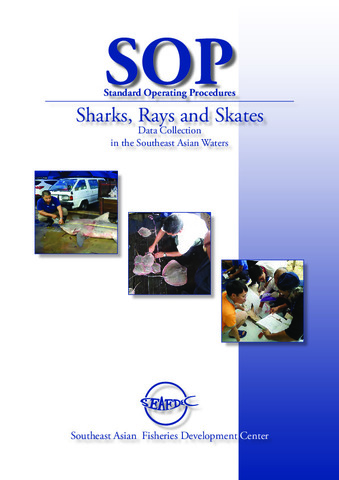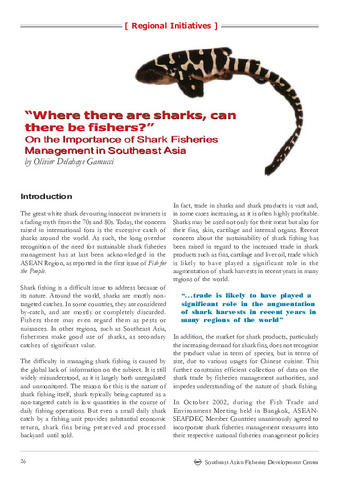Paving the way for the development of non-detriment findings: Towards precise species identification of sharks and rays in Southeast Asia
Share
นามธรรม
CITES defines non-detriment finding as “a conclusion by a Scientific Authority that the export of specimens of a particular species will not impact negatively on the survival of that species in the wild. The non-detriment finding by a Scientific Authority is required before an export or import permit or a certificate for an introduction from the sea may be granted for a specimen of an Appendix-I species, and before an export permit or a certificate for an introduction from the sea may be granted for a specimen of an Appendix-II species.” Many species of sharks and rays have been listed in the CITES Appendices in view of the increasing exploitation of such species that has become an international concern resulting in the promotion of their conservation and management through the enforcement of trade management measures and control. Considering that listing of commercially-exploited aquatic species in the CITES Appendices, e.g. sharks and rays, would have certain impacts not only on the management of the fisheries of these species but also on the economies of many countries of the region that have been trading some of the species and their “look-alikes” as well as trading in parts of their processed forms, SEAFDEC has been implementing projects that would help the Southeast Asian countries in addressing the issues concerning such species that had been listed in the CITES Appendices. In the case of sharks and rays, SEAFDEC has been supporting the countries in their efforts to improve data collection, especially in recording the landings of sharks and rays at species level, by enhancing the capacities of the countries in species identification. With sufficient knowledge and skills in the precise identification of the species found in the waters of Southeast Asia, the countries could continue trading the commercially-exploited aquatic species that are listed in the CITES Appendices provided these are accompanied with non-detriment findings. Thus, SEAFDEC has also been advocating the establishment of non-detriment findings that provide the scientific evidence to prove that trading of such commercially-exploited aquatic species would not endanger the survival of the wild populations of such species.
การอ้างอิง
Arnupapboon, S., Ali, A., Wanchana, W., & Sulit, V. T. (2019). Paving the way for the development of non-detriment findings: Towards precise species identification of sharks and rays in Southeast Asia. Fish for the People , 17(2), 10-15. http://hdl.handle.net/20.500.12066/5520
เรื่อง
คอลเลกชัน
รายการที่เกี่ยวข้อง
แสดงรายการที่เกี่ยวข้องตามชื่อผู้แต่งผู้สร้างและเรื่อง
-
Shark and ray fisheries in Cambodia: A review of national management activities
Try, Ing; Jensen, Kathe R.; Sereywath, Pich; Longdy, Va (Secretariat, Southeast Asian Fisheries Development Center, 2004)Cambodia is both a signatory party to CITES and a member of FAO, and thus is required to implement a national plan of action for the conservation and sustainable use of shark and ray resources. But at the national level ... -
Standard Operating Procedures (SOP) Sharks, Rays and Skates Data Collection in the Southeast Asian Waters
Ali, Ahmad; Abe, Osamu; Dharmadi; Fahmi; Pek Khiok, Annie Lim; Arshad, Abdul Haris Hilmi Ahmad; Krajangdara, Tassapon (Secretariat, Southeast Asian Fisheries Development Center, 2017)Over the past two decades, human exploitation of sharks has substantially increased worldwide. Worldwide increasingly concerns and attempts are on sharks conservation and management. The Southeast Asian region has richest ... -
"Where there are sharks, can there be fishers?" On the importance of shark fisheries management in Southeast Asia
Gamucci, Olivier Delahaye (Secretariat, Southeast Asian Fisheries Development Center, 2003)An overview on the importance of shark fisheries management in Southeast Asia is given. In particular recent progress in the region, status and trends of shark fisheries, utilization and trade of shark are given.






